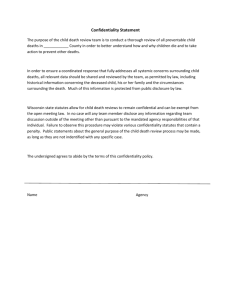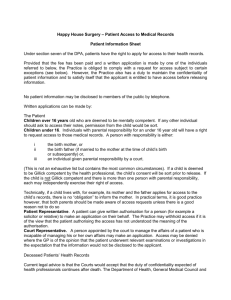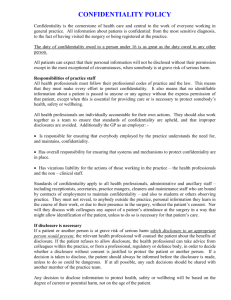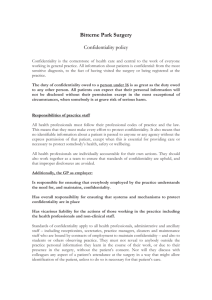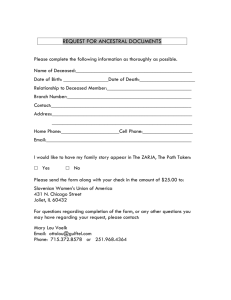SOP 4: Data Extraction Policy
advertisement
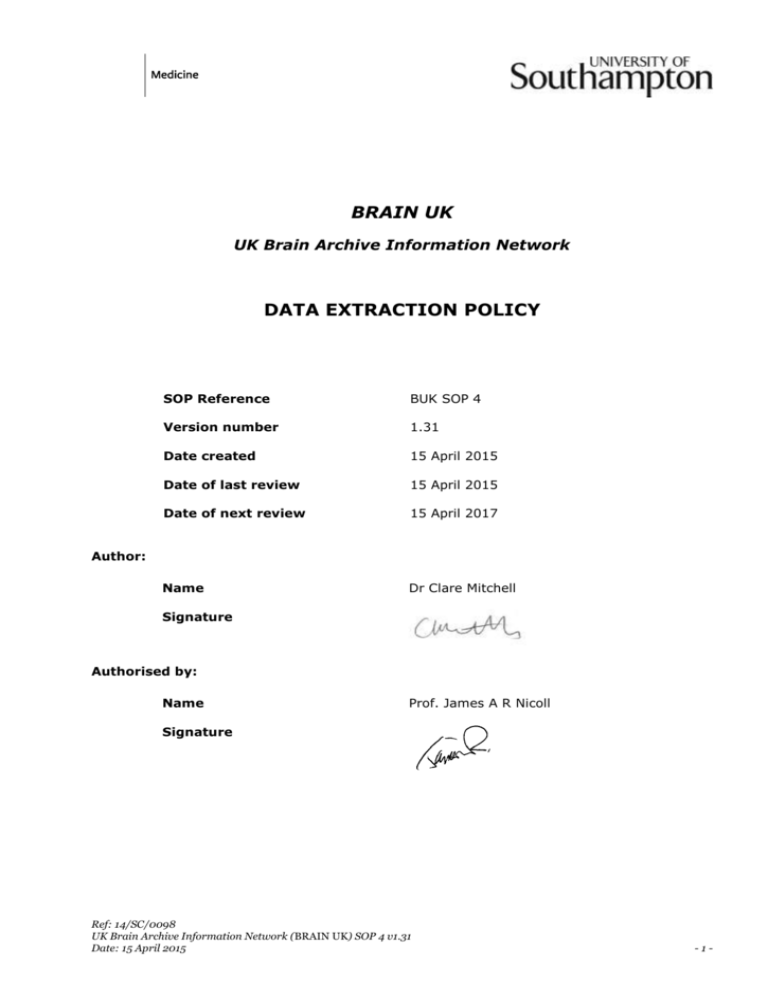
BRAIN UK UK Brain Archive Information Network DATA EXTRACTION POLICY SOP Reference BUK SOP 4 Version number 1.31 Date created 15 April 2015 Date of last review 15 April 2015 Date of next review 15 April 2017 Name Dr Clare Mitchell Author: Signature Authorised by: Name Prof. James A R Nicoll Signature Ref: 14/SC/0098 UK Brain Archive Information Network (BRAIN UK) SOP 4 v1.31 Date: 15 April 2015 -1- THIS PAGE IS BLANK Ref: 14/SC/0098 UK Brain Archive Information Network (BRAIN UK) SOP 4 v1.31 Date: 15 April 2015 -2- Table of Contents 1. Background 5 2. Legal and Ethical Considerations 2.1 The Common Law Duty of Confidentiality 5 6 3. Data Access and Extraction 3.1 Persons Responsible for Data Retrieval and Processing 3.1.1 Primary Care Team 3.1.2 External Individuals 3.1.3 Researchers 3.2 Patient Identification 3.3 Defined Patient Dataset 3.3.1 Date of Birth 6 6 7 7 7 8 4. References 8 Ref: 14/SC/0098 UK Brain Archive Information Network (BRAIN UK) SOP 4 v1.31 Date: 15 April 2015 -3- THIS PAGE IS BLANK Ref: 14/SC/0098 UK Brain Archive Information Network (BRAIN UK) SOP 4 v1.31 Date: 15 April 2015 -4- 1. Background The UK Brain Archive Information Network (BRAIN UK) is an MRC-funded initiative that intends to catalogue the tissue archival holdings of participating NHS neuropathology centres around the UK. The ultimate aim of the project is to create a centralised, comprehensive and anonymised database which will ultimately be made available to the UK research community using the website of the British Neuropathological Society as a portal. It is envisaged that such an information resource will facilitate high quality medical and biomedical research by allowing research groups to identify potential sites holding tissue of pertinence to their existing and future research studies. 2. Legal and Ethical Considerations The data of interest in the compilation of the BRAIN UK database to be derived from the medical records (primarily the computerised laboratory records) of the both living and deceased individuals. The principles and requirements of the Data Protection Act 1998 does not apply to the deceased[1] meaning that there is an immediate difference in the legal obligations regarding the storage and use of data dependent upon its status. With regards to the medical records of the deceased, these are in part catered for by the Access to Medical Records Act 1990 but this legislation primarily relates to access to the medical records of the deceased by those who may have a claim arising from the patient’s death and only applies to records created since 1st November 1991[2]. More recently, there has been an indication that access may also be facilitated via the Freedom of Information Act 2000 and this has subsequently been clarified to conclude that the duty of confidence is not absolute and may be waived if consent to do so is given by the individual, disclosure is required as a legal duty or it is in the public interest to do so.[21]. The Bluck case[22] initially indicated that disclosure may be exempted under Section 41 of the Freedom of Information Act 2000 but as a consequence of the relevant clarification by the Information Commissioner’s Office (ICO) this position was rejected as disclosure of patient information would not have been in the public interest in this instance. Additionally, disclosure of such information, where there may be interference of the rights of surviving family members (so-called ‘survivor privacy’), may be potentially prevented under Section 44 of the Human Rights Act 1998. This legislation applies to living individuals and so there is a degree of ambiguity regarding the deceased and this has been exemplified by a change in the advice of the ICO indicating that this legislation should not act as a statutory bar[3]. Although greater clarity regarding access to the medical records of the deceased for research purposes has been forthcoming in the recent past there still remains a grey area exacerbated by a lack of formal legal obligations to confidentiality that apply to the deceased[4]. Although there is agreement upon the ethical basis for the maintenance of the privacy and the common law confidentiality of individuals and their relatives after death[5], it is felt that the intended nature and scope of this initiative would make it insupportable in terms of available time and resources to undertake obtaining consent for access to and disclosure from the medical records of the deceased. In addition, given the extrapolated volume of surgical cases available now and into the future, to obtain consent on a case-by-case basis would greatly diminish the power of the initiative and greatly restrict the scope, coverage and depth of the proposed database. Therefore, it is proposed that, as obtaining consent would be onerous and disproportionate, an approach will be made to the National Information Governance Board for Health and Social Care Ethics and Confidentiality Committee (NIGB-ECC) to seek permission for disclosure under Section 251 of the National Health Service Act 2006 using procedures developed in line with advice and guidance received after discussions with the Approvals Manager of the NIGB-ECC. However, as the NIGB-ECC only cover England and Wales, separate applications will also be made to the relevant bodies with jurisdiction in Scotland and Northern Ireland. In addition, there are ethical considerations pertaining to approaching the families of the deceased as this has the potential to cause harm or distress especially if the nature of the bereavement related to a distressing condition or incident. In addition, it would also be inappropriate to return to the bereaved family if a number of years have elapsed since the Ref: 14/SC/0098 UK Brain Archive Information Network (BRAIN UK) SOP 4 v1.31 Date: 15 April 2015 -5- time of death as this may again have the potential to cause harm and revisit events that may have been emotionally adjusted to. With regards to the potential passage of time, it may also be difficult to locate family members to obtain consent due to migration or, indeed, death. It is accepted that during the process of accessing the medical records and the anonymisation of any subsequent data that individuals may be privy to personal identifying information. It is intended that linked anonymisation will occur as soon as is practicable and that this process will either be undertaken by the original custodians of the data or, as a contingency measure, by a single nominated individual within the BRAIN UK research team after the necessary approvals of the NIGB-ECC for ‘Section 251 support’ have been sought and local data custodians have also granted relevant management approvals. This greatly minimises the access to such sensitive information and greatly reduces the scope for inappropriate dissemination of this information beyond the research team. In addition, there are contractual mechanisms and safeguards in place that would bring forward sanctions should there be a breach of confidentiality or an inappropriate disclosure of information. 2.1 The Common Law Duty of Confidentiality The Common Law in the various legal systems of the United Kingdom is based upon the concept of precedence. As a result of this its impact and applications are not always transparent and there is an obvious scope for it to change over time. Whilst it may be possible for varying interpretations of the Common Law to be possible, in relation to the access to and disclosure from medical records of the living, there is a need to obtain consent of particular individuals involved and this should ideally be informed consent. In addition, there is a bound obligation to a duty of confidentiality in relation to the disclosure of information about a living individual and this is enshrined in employment contracts of the NHS and other organisations as well as being established with professional codes of conduct. However, there is no such readily defined legal obligation relating to the disclosure of information from the medical records of the deceased as there are to the living. However, it widely accepted that an ethical obligation to a duty of confidentiality and privacy should extend to individuals and their relatives after death and, as a consequence, the safeguards that are implicit in the protection of the privacy and confidentiality of the living are also applied to the deceased for practical purposes. 3. Data Access and Extraction 3.1 Persons Responsible For Data Retrieval and Processing 3.1.1 Primary Care Team The access to the medical records of the patients (principally autopsy reports) and subsequent disclosure should, in the first member of a patient’s care team as the most ethical means of duty of confidentiality. This will typically be interpreted Neuropathology, Laboratory Manager or a Biomedical Scientist. computerised laboratory and instance, be undertaken by a maintaining the common law as being a Consultant in 3.1.2 External Individuals As it is a primary aim of BRAIN UK to be as comprehensive as possible in terms of covering as many suitable neuropathology centres as possible. It is envisaged that some centres may cite resource difficulties, such as time or resource, as a reason not to participate. In these situations a nominated member of the BRAIN UK team will be offered to undertake this duty personally by visiting relevant centres. This work will only be performed once the relevant permissions have been obtained from each participating centre and only with such an individual owing a duty of confidentiality. In addition, an application will be made to NIGB-ECC for their permission to access patient records on a case-by-case basis. Ref: 14/SC/0098 UK Brain Archive Information Network (BRAIN UK) SOP 4 v1.31 Date: 15 April 2015 -6- 3.1.3 Researchers Access to relevant existing medical records (e.g. clinical history, medication history, X-ray and imaging) would permit an increase in both the quantity and quality of data available for a particular research project as well as improving the scope of study types potentially supportable. Given the additional is doubtful whether resources available. Section 251 support data. workload in undertaking this work on behalf of the research community it Participating Centres or BRAIN UK would have the immediate time or BRAIN UK will therefore encourage researchers to seek evidence-based from NIGB-ECC should they wish to augment their studies with additional Such data would only be made available in an anonymised format and the anonymisation process would be undertaken within a Participating Centre with no patient identifiable data leaving these locations. All such work would, in addition to an application for Section 251 support, also require that relevant local conditions and approvals are met. 3.2 Patient Identification The identification of those individuals for inclusion in the BRAIN UK database will be performed electronically using search functions which are incorporated into each participating centre’s laboratory computer system. It is conceivable that, as part of this process, patient-identifying data will be available (e.g. name, postal address, GP contact etc.). It is therefore important to reiterate the importance of the maintenance of the common law duty of confidentiality and that such information should not be recorded or included in the final dataset. 3.3 Defined Patient Dataset A defined dataset will be obtained from each participating centre which will give information concerning the nature and format of available tissue as well as permitting each centre to identify the location of such tissue to facilitate its retrieval for future research applications. The defined dataset is as follows: Diagnostic category Diagnostic code (SNOMED CT or equivalent) Laboratory/Post Mortem Number Tissue format Age at death Age at operation Sex Geographical location It is accepted that different participating centres will utilise differing diagnostic coding systems dependent upon largely upon local custom and preference. The diagnostic coding system to be used by BRAIN UK will be standardised although, as part of the data collection exercise, it is envisaged that the merits of those systems used will determined and one adopted for use. Ref: 14/SC/0098 UK Brain Archive Information Network (BRAIN UK) SOP 4 v1.31 Date: 15 April 2015 -7- 3.3.1 Date of Birth Patient age may be an important variable for stratified research and we have previously collected age at death for BRAIN UK 1 and BRAIN UK 2 as this data is typically readily available. However, after feedback from Participating Centres, it has become clear that a corresponding ‘age at time of operation’ from living patients is not recorded in the same manner and would need to be derived. This would most simply be performed by comparing the date an operation was performed (or the date any tissue was received by the laboratory as a proxy) with the patient’s date of birth. After advice from the Approvals Manager of the NIGB-ECC it became evident that despite information such as date of birth being visible during the case selection and data anonymisation process the active use of such data in this manner would necessitate Section 251 support if performed outside of the primary care team environment. It is therefore intended that, as outlined in Section 3.1 above, that the derivation of ‘age at operation’ will be performed in the first instance by a member of the patient’s care team. If this is not possible for the reasons discussed in Section 3.1.2 then BRAIN UK would submit an evidence-based application to the NIGB-ECC for Section 251 support to allow this work to be undertaken by BRAIN UK on behalf of the participating centre(s) in question. 4. References 1. The Data Protection Act 1998: http://www.opsi.gov.uk/acts/acts1998/ukpga_19980029_en_1 2. Access to Medical Records Act 1990: http://www.opsi.gov.uk/acts/acts1990/ukpga_19900023_en_1 3. Information Commissioner’s Office Freedom of Information Policy Knowledge Base: http://ico.org.uk/foikb/PolicyLines/FOIPolicyAccesstomedicalrecordsofthedeceased.htm 4. Department of Health (September 2007) NHS Information Governance: Guidance on Legal and Professional Obligations: https://www.gov.uk/government/publications/nhs-informationgovernance-legal-and-professional-obligations 5. Department of Health (November 2003) Confidentiality: NHS Code of Practice: http://www.connectingforhealth.nhs.uk/systemsandservices/infogov/codes Ref: 14/SC/0098 UK Brain Archive Information Network (BRAIN UK) SOP 4 v1.31 Date: 15 April 2015 -8-

